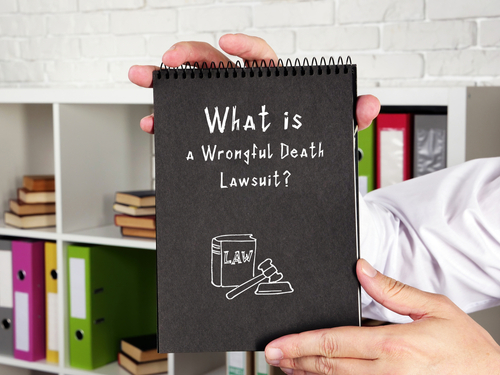Every year, nearly 170,000 deaths in the U.S. are the result of unintentional injuries, leaving families not only heartbroken but often grappling with overwhelming financial and legal challenges.
In Nevada, if your loved one tragically passed away due to someone else's negligence, you may ] seek justice through a wrongful death lawsuit. However, only certain individuals are legally eligible to file such claims.
This article will guide you through the eligibility requirements and steps in filing a wrongful death lawsuit in Nevada. Our goal is to equip you with the knowledge you need to pursue justice and find some measure of peace during this difficult time.
If you need personalized guidance, call us at (702) 444-3228 today. We're here to help you every step of the way.

What Is a Wrongful Death Lawsuit?
A wrongful death lawsuit in Nevada is a legal action brought against a party whose negligence or intentional act has caused the death of another person. Wrongful death claims provide financial compensation to the surviving family members or the estate of the deceased for their loss.
Eligible Parties: Who Can File?
In Nevada, not everyone affected by a loved one’s death has the legal standing to file a wrongful death lawsuit. According to Nevada Revised Statutes (NRS) § 41.085, the law restricts eligibility to specific individuals who the law deems to have a direct interest in the case.
This includes:
1. Personal Representative of the Deceased’s Estate
The primary individual who can file a wrongful death lawsuit is the personal representative of the deceased’s estate. This person is typically named in the deceased’s will and is responsible for managing the estate, including pursuing legal claims on behalf of the deceased. If no personal representative is designated, the court may appoint one.
2. Intestate Heirs
If the deceased did not leave behind a will, or if no personal representative is available, the right to file the lawsuit passes to the intestate heirs. Nevada's intestacy laws specify who these individuals are, generally prioritizing immediate family members.
The eligible parties include:
- Spouse or Domestic Partner: The surviving spouse or registered domestic partner is first in line to file a wrongful death claim. They have a direct and substantial interest in the outcome of the case.
- Children: If the deceased had children, they also have the right to bring a wrongful death lawsuit. This includes both biological and legally adopted children.
- Parents: In cases where the deceased had no spouse or children, the surviving parents may file the lawsuit. Their eligibility depends on the absence of higher-priority heirs.
- Siblings: Siblings may file a claim if the deceased has no surviving spouse, children, or parents. Their right to file comes after other close family members.
3. Excluded Parties
Certain individuals, despite their close relationship with the deceased, are not eligible to file a wrongful death lawsuit under Nevada law.
These include:
- Fiancées and Significant Others: Even if the deceased was engaged or in a long-term relationship, the law does not grant standing to fiancées or unregistered significant others.
- Close Friends: Friendships, no matter how deep, do not confer legal standing to pursue a wrongful death claim.
- Distant Relatives: Extended family members, such as cousins or aunts and uncles, generally do not have the legal right to file unless they can demonstrate a closer legal relationship, which is rare.
The limitation of who can file a wrongful death lawsuit ensures that only those with a legally recognized interest in the deceased’s estate can seek compensation for their loss. This also prevents legal disputes from becoming overly complicated with too many claimants.
Legal Requirements and Limitations
1. Statute of Limitations
Timing is one of the most critical aspects of filing a wrongful death lawsuit. Under NRS § 11.190(4)(e), Nevada imposes a strict statute of limitations on wrongful death claims.
You must file the lawsuit within two years from the date of the deceased person's death. Failing to meet this deadline typically results in losing your right to seek compensation, regardless of how strong your case might be.
2. Proving Liability
In a wrongful death case, the burden of proof rests on the plaintiff, meaning you must demonstrate that the defendant’s actions directly caused your loved one’s death.
This involves establishing four key elements:
- Duty of Care: Showing that the defendant owed a duty of care to the deceased.
- Breach of Duty: Demonstrating that the defendant breached that duty through negligence or intentional misconduct.
- Causation: Proving that this breach directly caused the death.
- Damages: Providing evidence of the financial and emotional impact the death has had on the surviving family members.
3. Special Circumstances
As with eligibility, Nevada law also defines special circumstances for wrongful death claims. For instance:
- Government Entities: If the wrongful death occurred due to a government entity or employee, different rules and shorter timelines (as little as six months) may apply.
- Intentional Acts: While most wrongful death claims are based on negligence, cases involving intentional acts may also involve criminal proceedings. However, the civil wrongful death lawsuit takes place independently of any criminal charges the defendant might face.
How We Will Help You
Having the right legal guidance makes all the difference when facing the complexities of a wrongful death lawsuit in Nevada. Our role is to navigate the legal process on your behalf, ensuring we take every step to build a strong and compelling case.
1. Conducting a Thorough Investigation
Proving liability in a wrongful death case requires a detailed and thorough investigation. We take care of gathering all the necessary evidence, including medical records, witness statements, and expert testimony, to establish a clear connection between the defendant’s actions and your loved one’s death.
2. Maximizing the Value of Your Damages
A key aspect of any wrongful death claim is determining the full extent of your damages. Shortly after becoming a client, you will have a Zoom meeting with Scott, where he will explain how case values are determined and discuss steps you can take to maximize your potential compensation.
3. Managing the Legal Process
The legal journey from filing a wrongful death lawsuit to potentially going to trial involves many stages, each with its own procedures and deadlines.
We will handle these on your behalf, ensuring that your case progresses smoothly through each phase. This allows you to focus on healing and remembering your loved one without the added stress of legal concerns.
The Process of Filing a Wrongful Death Lawsuit
1. Initial Consultation and Case Evaluation
The first step in filing a wrongful death lawsuit is meeting with us for an initial consultation. During this meeting, we will review the details of your case, discuss the circumstances surrounding your loved one’s death, and evaluate whether you have a viable claim.
This is also when we will begin gathering preliminary evidence and identifying key issues that we will need to address.
2. Filing the Lawsuit
Once we have established that you have a strong case, we will prepare and file the necessary legal documents with the appropriate court. This includes drafting a complaint that outlines the facts of the case, the legal basis for the wrongful death claim, and the damages you are seeking.
3. Discovery Phase
After we file the lawsuit, both parties enter the discovery phase. This is where we will exchange information with the defendant’s legal team, including documents, witness lists, and other evidence.
During discovery, all parties will take depositions (sworn out-of-court testimonies) from witnesses and experts.
4. Settlement Negotiations
Many wrongful death cases are settled out of court through negotiations. During this stage, we will negotiate with the defendant’s legal team to reach a fair settlement that compensates you for your losses.
Our goal is to ensure that any settlement reflects the true value of your claim, taking into account all the ways in which your loved one’s death has impacted your life.
5. Trial (If Necessary)
If we can’t reach a fair settlement, the case may proceed to trial. At trial, both sides will present their arguments, evidence, and witness testimonies before a judge or jury.
We will advocate on your behalf, presenting a compelling case to demonstrate the defendant’s liability and the extent of your damages. The trial process can be lengthy, but it is an opportunity to seek the full compensation you deserve if settlement negotiations break down.
6. Post-Trial and Appeals
After the trial, the court will issue a judgment. If the outcome is favorable, the court will order the defendant to pay the damages awarded. However, either party has the right to appeal the decision, which can extend the process.
We will continue to represent your interests through any post-trial motions or appeals to ensure that you receive the justice and compensation owed to you.
Types of Recoverable Damages
1. Economic Damages
Economic damages cover the direct financial losses associated with the wrongful death.
These are typically easier to calculate and include:
- Medical Expenses: Any medical costs incurred before your loved one’s death as a result of the injury or illness caused by the defendant's actions.
- Funeral and Burial Costs: Reasonable expenses related to the funeral, burial, or cremation services.
- Lost Wages and Benefits: Compensation for the income your loved one would have earned if they had lived, including lost wages, benefits, and potential future earnings.
- Loss of Financial Support: If the deceased provided financial support to dependents, you can claim the loss of that support as part of the damages.
These damages aim to alleviate the financial burden caused by the sudden loss of a loved one and help the family maintain their financial stability.
2. Non-Economic Damages
Non-economic damages are more subjective and compensate for the emotional and psychological impact of the loss. They include:
- Pain and Suffering: Compensation for the emotional distress, grief, and mental anguish experienced by the surviving family members.
- Loss of Companionship and Consortium: The loss of the deceased’s companionship, love, care, guidance, and affection. This can apply to both the spouse and children.
- Loss of Parental Guidance: Compensation for the emotional and developmental impact on children who have lost a parent.
3. Punitive Damages
In certain cases where the defendant’s actions constituted gross negligence or were malicious, the court may award punitive damages. These are not meant to compensate the family but to punish the defendant and deter similar behavior.
4. Survival Action Claims
Survival action claims aim to seek compensation for the pain and suffering the deceased endured before their death, as well as any medical expenses or lost wages from the time of injury until death.
This type of claim is distinct from wrongful death, and in some cases, both types of claims can be filed simultaneously, especially if the deceased did not die immediately from their injuries. This allows the family to seek comprehensive compensation for both their own losses and the losses the deceased suffered prior to their death.
Get the Justice You and Your Family Deserves
Time is of the essence when it comes to filing a wrongful death lawsuit. We know the loss of a loved one is devastating, but seeking justice is a serious matter that requires immediate and focused attention.
At High Stakes Injury Law, we are committed to standing by your side through every step of the legal process, ensuring that you receive the compensation and closure you deserve.
Don’t let the complexities of the legal system add to your burden—let us fight for you. Reach out to us today at (702) 444-3228 to begin your journey towards justice.
